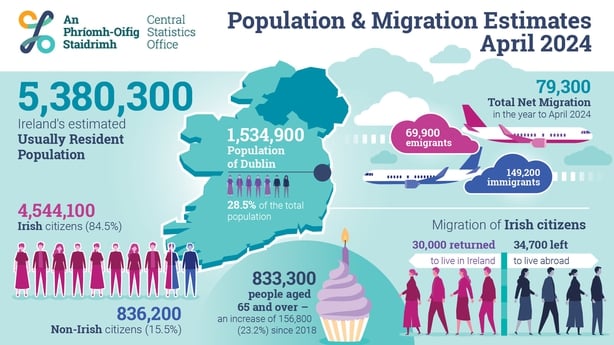From doctors to fruit pickers, and home carers to truck drivers, Ireland relies on workers from abroad to fill vital jobs across the economy.
If those workers are coming from outside the European Economic Area (EEA) they need a work permit.
For years, Ireland’s employment permit system has been criticised for being too inflexible and in need of modernisation.
On Monday, a series of major changes to the permit system will come into force.
What will change?
Regulations under the Employment Permits Act will see permit holders being able to change employer after a nine-month period.
A new seasonal employment permit will be introduced to support the seasonal needs of certain sectors such as fruit picking.
Subcontractors will be given access to the employment permit system.
There will be a requirement for additional conditions such as training and accommodation support for employment permit holders.
The new regulations will introduce permits for non-consultant hospital doctors which will allow them to work at multiple sites.
The changes will also allow permit holders to be promoted within their roles without the need for a new permit.
Announcing the reforms in recent days, the Government said they will make the permit system more easily adaptable, allowing it to respond quickly to changes in the labour market and business needs.
“The improvements in the new Act will allow for a more modern, flexible employment permits system as well as ensuring employee rights are maintained,” said Minister for Enterprise, Trade and Employment Peter Burke.
Do the changes go far enough?
Barry Whelan is the CEO of the Excel Recruitment Group. He thinks that while the long-overdue reforms are welcome they do not go far enough.
“If we are to maintain our competitive edge and meet growing labour demands, especially in sectors like hospitality, healthcare, and construction, additional reforms are urgently needed,” Mr Whelan said.
He believes that processing times for work permits remain too slow and continue to create bottlenecks for businesses that require urgent staffing.
Mr Whelan is calling for further streamlining of the permit application process to reduce wait times and to ensure that employers can access talent when they need it most.
He is also warning that the scope of eligible roles for employment permits remains too narrow.
Read more: Changes to work permits to come into force next week
“It continues to exclude many occupations where there is clear evidence of labour shortages. The categories of roles eligible for work permits need to be expanded, particularly in critical sectors like retail, hospitality, logistics and care work,” Mr Whelan said.
There have also been calls for greater supports for long-term integration and training for workers who come here from abroad.
“We need to invest in training and development programmes that will enable these workers to upskill and progress in their careers, not just fill short-term labour gaps,” Mr Whelan said.
Freedom to change employer
The Migrant Rights Centre Ireland (MRCI) has welcomed the reforms that will allow certain categories of permit holders to change employer after a specified period of time.
“The right to change employer for work permit holders is a major victory for thousands of people across Ireland who provide vital care for older people, build our roads and houses, drive our buses and pick, process and cook our food on a daily basis,” said Edel McGinley, Director, MRCI.
“The work permit system has for too long tied a person to one employer and as a result they were easily taken advantage of. In our experience restricting a person to one employer has been the biggest factor leading to the cases of gross exploitation of migrant workers that we come across.”
MRCI recently represented Sharanjeet Kaur, a restaurant worker who was awarded more than €143,000 by an Adjudication Officer for breaches of her employment rights.
“I was trapped. I did not know what to do and I did not want to risk my immigration here and become homeless. I had no choice but to stay in a bad situation,” Ms Kaur said.
“Being able to leave and work somewhere else is important. It means people like me who are not being treated fairly will have options and will be able to stand up for ourselves,” she added.
Concerns have been expressed however that the ability to change employer is too restrictive and that the Government could have gone further when it comes to this reform.
The change of employer rules applies to General Employment Permits (GEP) and Critical Skills Employment Permits (CSEP).
Holders of GEPs can only apply to change to an employer within the type of employment for which they have been granted a permit. For example, a meat processing operative can only move to another meat processing role.
Holders of CSEPs can change to an employer across a broader category of employment.
Restrictions on the movement of GEP holders have been described as a missed opportunity that will limit career progression and talent retention.
There have been calls for greater flexibility for skilled workers to transition across different industries.
John Barry is the director of MSS – The HR People, which provides support and advice to employers on how to access the employment permit system.
“We are welcoming the fact that positive changes have been made to make the permit process quicker and more efficient but there is still room for further improvement which would allow employers to be able to recruit staff which at this time is a very serious problem,” Mr Barry said.
“I certainly think that every opportunity should be given to people who are on work permits to move within the workforce generally but there will still be difficulties for people employed in specialist industries who may want to move to a different industry doing the same work,” he added.
Public support for migrant workers
On Thursday, MRCI published the results of a survey showing that almost two-thirds of people, 64%, agreed that Ireland should welcome people who move here to make a better life for themselves or their families.
The research, which was conducted by Ireland Thinks, showed that 18% of those surveyed disagreed that Ireland should welcome people who move here.
Asked what Government policy should be towards undocumented migrant workers, 25% of respondents said they should be required to leave the country immediately, while 69% said they should be given the opportunity to come forward and legalise their status provided they can show they have been living and working here long-term.
The survey of 1,465 people showed that 82% agree that Irish companies should continue to be able to recruit people from outside the EU to work in sectors where it is difficult to fill skills or labour shortages.
When asked if people from outside the EU, recruited to work in Ireland through the work permit system, should be allowed to bring their immediate family, spouse and/or children with them, 65% agreed while 24% disagreed.

Rising immigration
On Tuesday, figures from the Central Statistics Office showed that immigration to Ireland has reached a 17-year high, with 149,200 people arriving in the country in the 12 months to April.
According to the CSO, 30,000 were returning Irish citizens, 27,000 were other EU citizens and 5,400 were UK citizens.
The remaining 86,800 immigrants were citizens of other countries.
The CSO said this was the third successive 12-month period where more than 100,000 people immigrated to Ireland.
The number of immigrants to the State in the year is estimated by the CSO to have grown by just over 5% to 149,200 from 141,600 when compared with 2023.
With Ireland continuing to enjoy near full employment, talent shortages and recruitment struggles are still major issues for many companies.
Employers who turn to workers from abroad to fill vacancies need to be able to access a modern, flexible employment permit system.
While companies compete for talent, Ireland as a country must compete with other nations when it comes to attracting workers from abroad.
Monday’s changes will bring some much-needed improvements to the work permit system, but ongoing monitoring and reform will be required to ensure Ireland remains a destination of choice for skilled workers from around the world.

